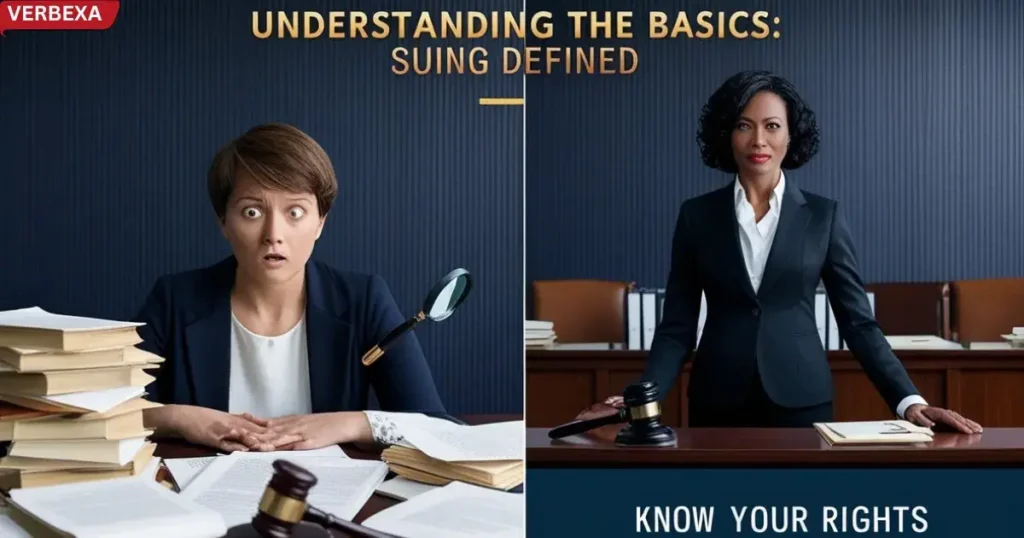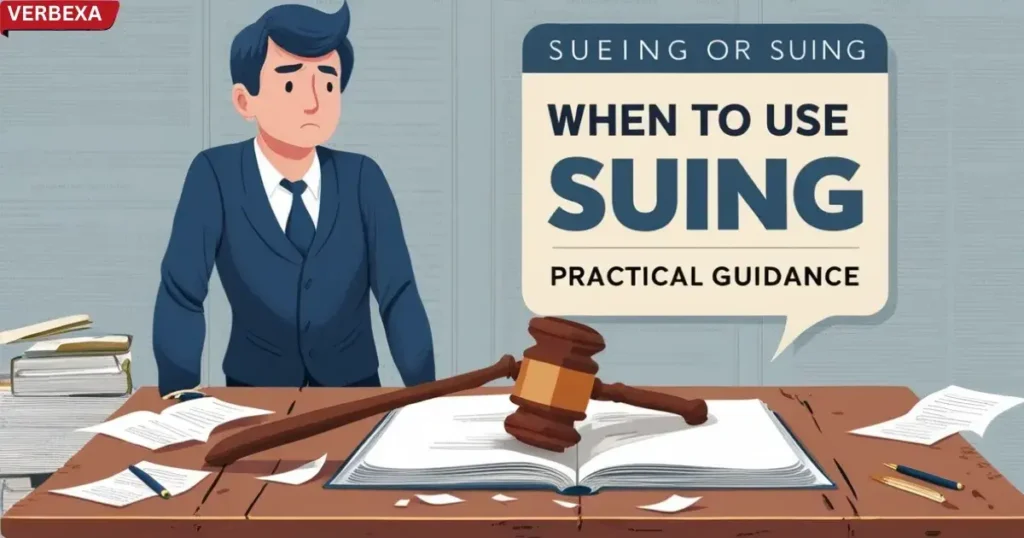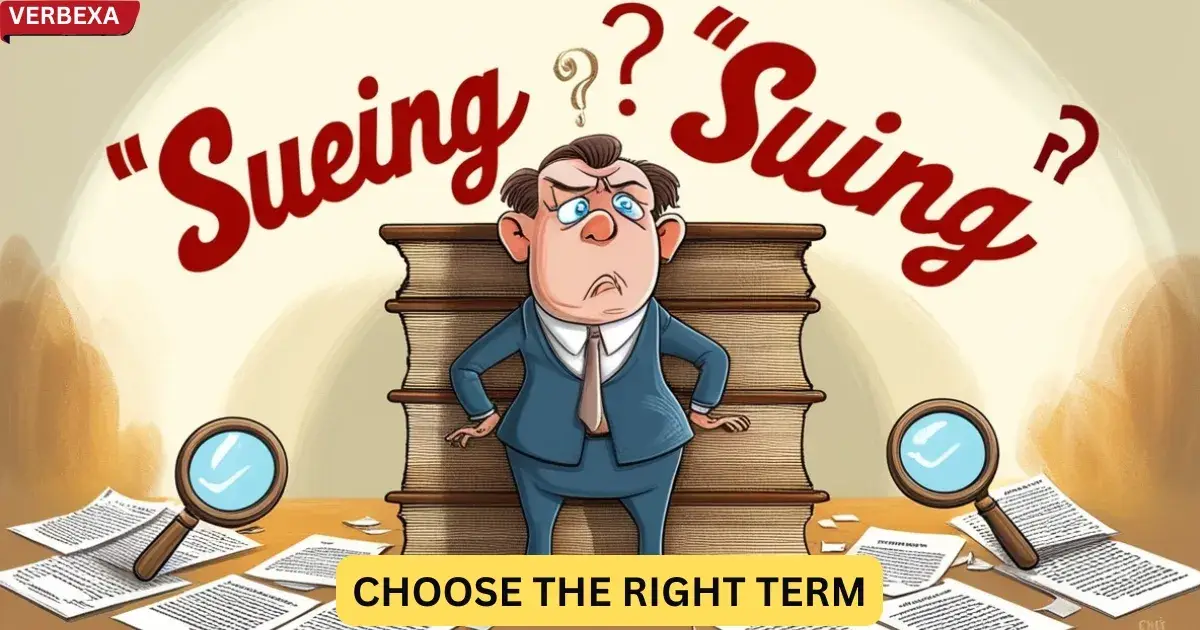In the realm of legal terminology, few words cause as much confusion as sueing and suing. Many individuals find themselves stumbling over this linguistic minefield, uncertain whether they’re using the correct term. Suing is the correct spelling, while sueing is a common misspelling that can undermine your professional communication.
Imagine you’re a small business owner preparing to address a critical legal dispute. You draft an important document, only to realize you’ve inadvertently used the incorrect spelling. Such mistakes can potentially diminish your legal credibility and professionalism.
This comprehensive guide will help you navigate the nuanced world of legal terminology, ensuring you communicate with precision and confidence. This article will clarify the difference between sueing or suing, providing you with the knowledge to navigate these situations with confidence. We’ll explore the proper usage, offer synonyms, and provide examples to ensure you never stumble over this common spelling mistake again.
Key Takeaways
- Suing is the correct spelling
- Use in formal legal contexts
- Demonstrates professional legal communication
Understanding the Basics: Suing Defined

Suing is a legal action where one party (the plaintiff) takes another party (the defendant) to a court of law to resolve a dispute. The term encompasses various scenarios, from breach of contract to seeking damages for negligence.
Pronunciation and Correct Usage
- Pronunciation: Suing is pronounced “soo-ing”
- Correct spelling: Always use “suing“, never “sueing“
Common Contexts of Suing
Suing can arise in multiple legal contexts:
- Breach of Contract: When one party fails to meet contractual obligations
- Negligence Claims: Seeking compensation for harm caused by improper care
- Unfair Dismissal: Challenging wrongful termination of employment
- Car Accident Compensation: Pursuing damages for injuries and losses
Synonyms for Suing
- Litigation
- Legal action
- Taking to court
- Pressing charges
- Instituting proceedings
- Filing a lawsuit
- Seeking legal remedy
- Pursuing legal action
- Initiating a case
- Challenging in court
Synonyms for Sue (the verb)
While the focus is on suing or suing, understanding synonyms for the root verb “sue” can enhance your understanding. Here are 10 synonyms for “sue”:
- Prosecute
- Indict
- Charge
- Accuse
- Impeach
- Take to court
- Bring suit against
- File a lawsuit against
- Pursue a legal claim against
- Seek legal redress against
Comprehensive Comparison: Sueing vs Suing
| Aspect | Sueing | Suing |
|---|---|---|
| Spelling | Incorrect misspelling | Correct legal term |
| Pronunciation | Incorrect | “soo-ing” |
| Professional Use | Not recommended | Professionally acceptable |
| Legal Context | Invalid | Represents formal legal action |
When to Use Suing: Practical Guidance

Appropriate Suing Scenarios
- Seeking damages in a legal dispute
- Filing a formal complaint
- Addressing negligence
- Resolving contractual conflicts
Communication Tips
- Always use suing in legal documentation
- Confirm spelling before submitting official documents
- Consult legal professionals for precise terminology
Real-World Usage Examples

- Correct: “The small business owner is suing the supplier for breach of contract.”
- Incorrect: “She is sueing the company for unfair treatment.”
- Correct: “They are suing for damages resulting from the car accident.”
Common Mistakes to Avoid
- Never use “sueing” in professional communications
- Double-check legal terminology
- Understand the context of legal proceedings
FAQs
What is the meaning of sueing?
“Sueing” is an incorrect spelling; it has no legal meaning. The intended meaning is to initiate a lawsuit.
What is the correct spelling of suing?
The correct spelling is “suing,” It denotes formally taking legal action against someone.
What is a word for suing?
“Litigation” is a formal synonym for suing, describing the process of taking legal action.
What is the act of suing?
Suing is the formal process of initiating a lawsuit against an individual or entity in court.
How to spell suing?
The correct spelling is “s-u-i-n-g.” Always use this spelling in legal or any formal contexts.
Conclusion: Mastering Legal Terminology
Suing is more than just a word—it’s a precise legal term representing serious legal action. By understanding its correct usage, you demonstrate professionalism and legal knowledge.
Suing represents a formal process of seeking legal resolution, while sueing is simply an incorrect spelling that should be avoided in all professional contexts. Remember the proper usage of words like suing or suing is crucial for professionalism. So, choose your words carefully, especially when dealing with legal matters.
Final Pro Tip
When in doubt about legal terminology, consult legal professionals or reliable references to ensure accuracy in your communications.
Disclaimer: This guide provides general information and should not be considered legal advice. Always consult with a qualified legal professional for specific guidance.

This author is a passionate linguist and grammar enthusiast, dedicated to helping individuals master the art of language. With years of experience in teaching and editing, she brings clarity and precision to every sentence. Tina’s mission is to empower writers of all levels to express themselves with confidence and excellence.

